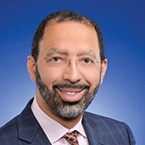
For visionary contributions to the establishment of genomics-driven precision cancer medicine by pioneering high-throughput adaptation of genomic technologies to profile human tumors to identify actionable cancer gene mutations, allowing for precise patient population stratification.
A world leader and visionary in the field of cancer genomics, Dr. Garraway has made crucial contributions to the field of precision cancer medicine including identifying genes involved in melanoma such as COT (MAP3K8) and describing its role in drug resistance to RAF inhibitors. Using SNP array-based genetic maps paired together with gene expression signatures, Dr. Garraway identified amplification of the melanocyte master regulator MITF (microphthalmia-associated transcription factor) in melanoma cells, establishing its role as an oncogene whose expression, when reduced, sensitizes melanoma cells to cytotoxic agents. He also described novel non-coding mutations in the telomerase gene (TERT), identifying two hot spots in its promoter region that generated a de novo binding site for E-twenty-six (ETS) transcription factors, increasing the transcriptional activity of TERT in melanoma cells. These TERT mutations have since been described as hallmark genetic insults in several cancers including bladder cancer, glioblastoma, and hepatocellular carcinoma.
Additionally, Dr. Garraway’s research group was the first to describe a high-throughput adaptation of genomic technologies (OncoMap) using mass-spectroscopy based genotyping to profile human tumors for actionable cancer gene mutations. This work has been essential to the establishment of precision medicine approaches to treating cancer. Dr. Garraway has also served as a champion for massively parallel sequencing as an effective approach to genomically profile clinical tumors, detecting mutations as well as chromosomal copy number alterations in clinical tumor samples, resulting in better informed therapeutic approaches for cancer patients. This forward-thinking approach of genomics-driven cancer medicine has revolutionized therapeutic strategies for cancer by improving the ability to stratify and enroll patient populations into appropriate clinical trials according to the genetic composition of their tumors.
Career Highlights
2016- 2019 Elected, Board of Directors, AACR
2016 Elected President, American Society for Clinical Investigation
2014 AACR-Minorities in Cancer Research Jane Cooke Wright Memorial Lectureship Award, AACR
2013 Paul Marks Prize for Cancer Research, Memorial Sloan Kettering Cancer Center
2012 Herbert and Maxine Block Lectureship Award for Distinguished Achievement in Cancer, Ohio State University
2011 Partners in Excellence Award, Massachusetts General Hospital
2009 Elected Member, American Society for Clinical Investigation
2007 New Innovator Award, National Institutes of Health
2006 Career Award in the Biomedical Sciences, Burroughs-Wellcome Fund, Research Triangle Park
2001, 2005 Minority Scholar Award, AACR